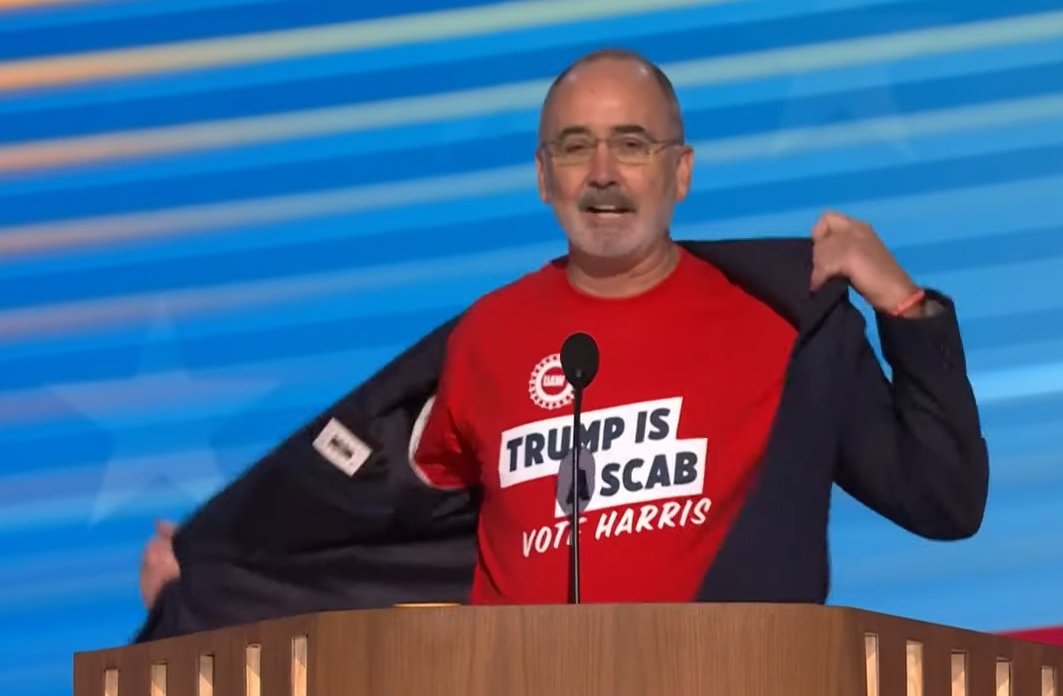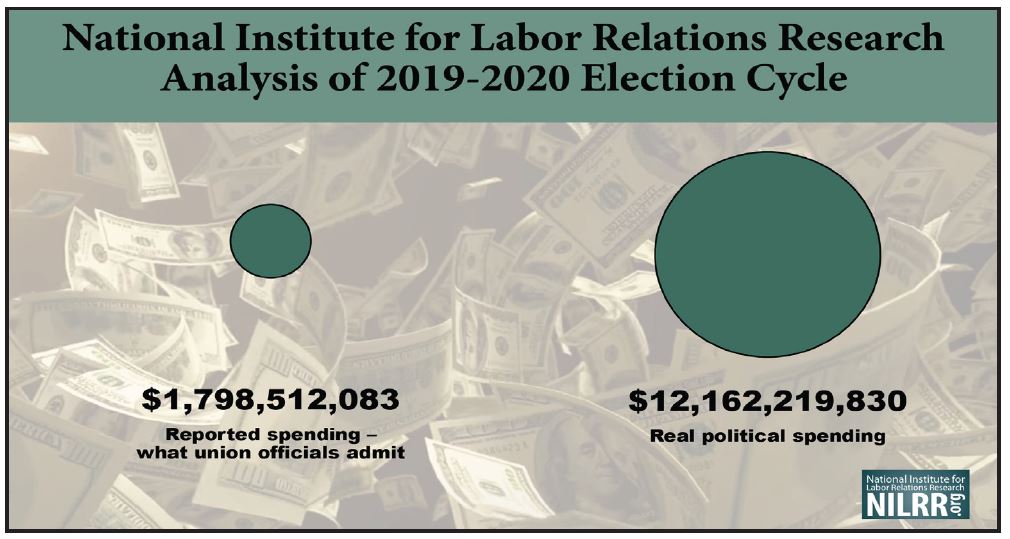Minnesota Electric Utility Employee Challenges IBEW Nationwide Policy Coercing Worker Contributions to Union’s Political Activity
Worker charges union with blocking her right under CWA v. Beck Supreme Court decision to end payments for union politics
Benson, MN (April 8, 2025) – An employee of Agralite Electric Cooperative, an electric utility company in Western Minnesota, has just filed federal charges against the International Brotherhood of Electrical Workers (IBEW) union, challenging nationwide restrictions union officials impose on workers who wish to cut off financial support for union political activities. The worker, Theresa Klassen, filed charges against both the IBEW international union and IBEW Local 160 at the National Labor Relations Board (NLRB) Region 18 in Minneapolis. Klassen is represented for free by National Right to Work Legal Defense Foundation staff attorneys.
The NLRB is the federal agency responsible for enforcing federal labor law and adjudicating disputes between employers, union officials, and individual employees. In her charges, Klassen is defending her rights under the landmark Foundation-won Communications Workers of America (CWA) v. Beck Supreme Court decision, which forbids union officials from forcing workers who have refrained from formal union membership to pay dues for anything beyond the union’s monopoly bargaining functions. Union political expenditures are one expense employees can opt out of paying by invoking their Beck rights.
Because Minnesota lacks Right to Work protections for its private sector workers, IBEW union officials can impose contracts that force Klassen and her coworkers to pay union dues as a condition of keeping their jobs. However, nonmember workers like Klassen can object to paying full dues and instead pay a reduced amount under Beck. In contrast, in Right to Work states like all of Minnesota’s neighbors, union membership and all union financial support are strictly voluntary.
“It’s disappointing that IBEW union officials can legally force me to fork over even a little bit of my paycheck to them after I resigned my membership, but refusing to pay for union politics is my right and the IBEW isn’t respecting it,” commented Klassen. “They’ve put a bunch of time limitations on when I can exercise this right, and are also requiring me to contact union bosses in Washington, D.C. who I have never met just to prevent my money from going toward union politicking I oppose. This is wrong.”
Filings: IBEW Officials Illegally Rebuffed Worker Twice After Receiving Requests to Stop Funneling Money to Union Politics
Klassen’s charges state that she first contacted her local union to resign her union membership in October 2024. While Local 160 union officials acknowledged her resignation letter, they claimed that the IBEW’s national policy is to “not allow nonmembers automatic Beck objector status,” and for that reason she would need to send a letter to the union’s international headquarters to opt out of paying for union politics. Local 160’s reply also stated that Beck objections would only be accepted during “window periods” of time comprising only 8-16% of the year, according to her charges.
Klassen’s charges also state that she sent a Beck objection letter to the IBEW international headquarters again in February 2025. IBEW union agents rejected this request as well, alleging that Klassen’s request fell outside the arbitrary time restrictions set by the union. Klassen is charging both IBEW Local 160 and the IBEW international union with enforcing these illicit limits on her Beck rights.
Window period restrictions on when employees can exercise their Beck rights allow union officials to extract money from workers who have already objected to financially supporting union activities. The creation of window periods is not authorized or otherwise mentioned in the National Labor Relations Act (NLRA), the federal labor law governing the private sector. Foundation attorneys are assisting multiple AT&T workers in Florida battle a similar scheme concocted by CWA officials.
“That IBEW union bosses are enforcing a nationwide policy making it needlessly difficult to stop supporting the union’s political activities should tell workers exactly what the union’s priorities are,” observed National Right to Work Foundation President Mark Mix. “While Beck rights are an important protection for workers in non-Right to Work states, no American worker should be forced to subsidize any union activities that they disagree with, whether political or not.”
DHS Security Guard’s Federal Lawsuit Forces IGUA Union Bosses to Stop Illegal Forced Union Dues Demands
After union officials did not provide legally required financial disclosures, guard wins reduction in mandatory union fees
Washington, DC (June 6, 2024) – Rosa Crawley, a security guard at the Department of Homeland Security’s Nebraska Avenue Complex, has triumphed after filing a federal lawsuit charging the International Guards Union of America (IGUA) with unlawfully demanding and seizing union dues from her paycheck. Crawley, who is employed by Master Security, forced the union to back off its illegal dues demands with free legal aid from National Right to Work Foundation staff attorneys.
Crawley is not a member of the IGUA union, but is still subject to IGUA’s monopoly bargaining power over the security guards at the DHS Nebraska Avenue Complex. As part of the settlement, IGUA union bosses must reduce the compulsory fee that they seize from Crawley as a condition of keeping her job. Before she filed suit, union bosses demanded the equivalent of full membership dues from her.
In her federal lawsuit, which she filed at the U.S. District Court for the District of Columbia, Crawley sought to defend her rights under the 1988 Right to Work Foundation-won CWA v. Beck Supreme Court decision.
While union officials can force private sector workers in non-Right to Work jurisdictions like the District of Columbia to pay dues or fees just to keep their jobs, the Beck decision prevents union bosses from forcing employees who have abstained from union membership to pay for anything beyond the union’s core bargaining functions, such as union bosses’ political activities. Full membership dues often contain charges for these unrelated items.
Beck also requires union bosses to furnish nonmembers who invoke their rights under the decision with an independent audit of the union’s finances and a breakdown of how union officials spend forced contributions.
Beck protections aren’t necessary in Right to Work states like neighboring Virginia, where union membership and all union financial support are fully voluntary.
IGUA Union Bosses Took Full Dues from Guard, Provided No Financial Disclosures
According to the suit, Crawley sent a letter to union officials resigning her union membership back in July 2023. Instead of immediately providing her with her Beck rights, union officials informed her that she would be charged a so-called “agency fee” which “is the same exact cost as what the union members pay.”
“So there will be absolutely no change in a financial sense,” the union’s reply letter stated.
Not satisfied with that explanation, Crawley in September 2023 formally invoked her Beck rights and asked union officials to reduce her dues payments in accordance with the decision. She also asked them to “provide [her] with an accounting, by an independent certified public accountant, that justifies Local 160’s calculation of its agency [forced] fee,” according to her lawsuit.
In an October 2023 reply to her Beck request, union officials used a confusing percentage averaging calculation to determine a fee amount that contradicted what they told Crawley when she resigned her membership. An independent audit of the union’s finances was nowhere to be found. Despite that, Crawley’s lawsuit reported that IGUA bosses continued to collect full union dues from her paycheck, and tried to impose extra steps that would need to be completed if she wanted to see the union’s financial info.
Workers Must Be On Guard for Illegal Union Uses of Worker Funds as Election Nears
After the filing of her lawsuit, Crawley expressed concern that her money was flowing toward union politics while IGUA bosses dragged their feet on honoring her Beck rights. “I shouldn’t have to pay for the IGUA union’s political activity just so I can continue to do my job,” commented Crawley. “Union officials have a legal obligation to stop charging me for politics and provide me with an accounting of how they are using my money, and so far they have done neither. This isn’t how they should treat the workers they say they ‘represent.’”
“We’re pleased that Ms. Crawley was able to terminate IGUA union officials’ outrageous seizure of full union dues from her paycheck,” commented National Right to Work Foundation President Mark Mix. “However, IGUA union officials’ inability to follow even the modest limitations that Beck places on their ability to impose mandatory dues on workers is ridiculous, and no worker should have to file a federal lawsuit to force union bosses into recognizing those rights.
“Workers’ right to prevent their money from going toward unwanted union activities, particularly politics, is especially important as union bosses try to push forward their agendas in advance of the 2024 election,” Mix added. “So workers should be vigilant of Beck violations, and remember they can contact Foundation attorneys for free legal aid in exercising their rights under that decision.”
Michigan Security Guard Slams Union with Federal Charges for Illegal Dues Seizures, Transparency Issues
Union officials fail to provide required information on how dues money is spent, already face vote which could stop forced-dues spigot
Grand Rapids, MI (May 8, 2024) – James Reamsma, a security guard whose posts include the Gerald R. Ford Federal Building and other government sites in the Grand Rapids area, has hit the United Government Security Officers of America (UGSOA) union with federal unfair labor practice charges maintaining that UGSOA union officials are seizing dues money from his paycheck without providing required disclosures on how the union spends worker cash. Reamsma filed the charges at Region 7 of the National Labor Relations Board (NLRB) in Detroit.
Reamsma is also leading his fellow security guards at Triple Canopy Inc. in an effort to vote away the UGSOA’s power to compel guards to pay dues or fees to the union in what is known as a “deauthorization election.” He is receiving free legal aid in both actions from the National Right to Work Legal Defense Foundation.
Reamsma’s charges seek to enforce his rights under the Communications Workers of America v. Beck Supreme Court decision, which was won by Right to Work Foundation attorneys. The Court held in Beck that union officials cannot force workers who have abstained from union membership to pay union dues or fees for expenses not directly germane to contract negotiations, such as union political activities. Workers who exercise their Beck rights are also entitled to an independent audit of the union’s finances, a breakdown of how union officials spend forced contributions, and an opportunity to challenge how the union calculates its reduced “Beck fee.”
Beck rights are only relevant in non-Right to Work jurisdictions like Michigan, where union officials have the legal privilege to force private sector workers to pay dues or fees as a condition of getting or keeping a job. In contrast, in Right to Work states like neighboring Indiana and Wisconsin, union membership and all union financial support are strictly voluntary. Michigan had Right to Work protections until a 2023 repeal rammed through by union partisans on the Michigan Legislature became effective earlier this year.
Union Dubiously Claims No Dues Money Goes to Politics
According to Reamsma’s charge, he submitted a notice to UGSOA union agents in March that requested the union reduce his dues payments in accordance with Beck and provide him with the required financial information. In response, union officials claimed that the amount of dues chargeable to nonmembers was equal to 100% of full union dues. Reamsma’s charge states that UGSOA “failed to provide the required financial disclosures for itself and its affiliated unions, and a chance to object to its alleged reduced fee.”
The charge also notes that, despite Reamsma notifying union officials in April that he prefers to pay union dues by check, UGSOA ignored this request and has continued to take money directly from his paycheck by payroll deduction. Federal labor law forbids union officials from using direct deduction to collect union dues or fees without worker consent.
Foundation attorneys argue in the charge that the union’s continued seizing of dues money from Reamsma’s paycheck “restrain[s] and coerce[s] Charging Party in the exercise of his Section 7 rights” under the National Labor Relations Act (NLRA). The NLRA protects the right of workers to refrain from union activities.
Guards May Vote to End Forced Dues
The NLRB has scheduled May 17 to count the votes in Reamsma’s deauthorization election, which is currently taking place by mail. If a majority of his colleagues vote to deauthorize the union, it will no longer have the legal power to coerce Reamsma and his colleagues to pay dues or fees as a condition of employment. Michigan’s non-Right to Work environment forces workers to either deauthorize a union or vote it out of a workplace completely (via a similar process known as “decertification”) if they want to end union officials’ forced-dues power.
“UGSOA union officials appear to be withholding vital information about how they spend worker money from the very security guards they claim to ‘represent,’” commented National Right to Work Foundation President Mark Mix. “If union bosses won’t respect basic worker rights regarding the collection and spending of dues money, Triple Canopy security guards should rightly be skeptical of whether UGSOA deserves the privilege to force them to pay dues or fees at all.
“While it’s illegal everywhere to force workers to pay for union political expenditures they oppose, the choice to financially back a union at all should rest solely with each individual worker, which is why Right to Work protections are so important,” Mix added.
Another MIT Grad Student Hits GSU Union with Federal Labor Charges for Illegally Seizing Money for Radical Union Agenda
Charges: Union officials imposing so-called ‘window period’ restriction to forbid civil engineering grad student from cutting off dues for politics
Boston, MA (April 26, 2024) – Following five Jewish students filing federal religious discrimination charges against the union, the MIT Graduate Student Union (GSU-UE) is now facing new federal unfair labor practice charges from civil engineering graduate student Katerina Boukin. Boukin’s charges, filed at the National Labor Relations Board (NLRB) with free legal aid from the National Right to Work Legal Defense Foundation, maintain that union officials are unlawfully seizing money from her research compensation to support union political activities she abhors.
Boukin seeks to enforce her rights under the 1988 Right to Work Foundation-won CWA v. Beck Supreme Court decision. The Court held in Beck that union officials cannot force those under their control to pay dues or fees for union expenses not directly related to collective bargaining, such as political expenses. Nonmembers who exercise their Beck rights are entitled to an independent audit of the union’s finances and a breakdown of how union officials spend forced contributions.
Beck rights are only relevant in non-Right to Work jurisdictions like Massachusetts, where union officials have the legal power to compel the payment of some union fees in a unionized environment. Because of controversial rulings by the Obama and Biden NLRBs, graduate students at private educational institutions like MIT are treated as “employees” who can be subjected to forced union representation and mandatory payments. In jurisdictions that have Right to Work protections, in contrast, union membership and all union financial support are strictly voluntary.
“GSU union officials are going above and beyond what is legal and are forcing me to pay for their political activities, including their opposition to Israel and promotion of Leninist-Marxist global revolution, that I find deeply offensive,” commented Boukin. “The GSU’s political agenda has nothing to do with my research as a graduate student at MIT, or the relationships I have with my professors and the university administration, yet outrageously they demand I fund their radical ideology.”
Union Still Seizing Dues for Politics Under Guise of ‘Window Period’ Restriction
According to Boukin’s charges, she and other graduate students resigned their memberships in the GSU union, revoked their dues “checkoff” authorizations, and objected under Beck to paying anything going toward GSU’s “political and non-representational agenda and expenditures.”
Despite these requests, the charges note, union bosses have “refused to process those Beck objections, refused to immediately reduce the amount of dues and fees collected from Charging Party’s and other graduate students’ [compensation], refused to stop the dues checkoff, and refused to provide Charging Party” with an independent audit explaining the union’s expenses and reduced fee calculation.
Instead, a GSU vice president told Boukin that she had missed an annual “window period” in which to exercise her Beck rights and that her objections would not be considered until November 2024. “In fact, the UE union has adopted an unlawfully restrictive Beck objection policy, precisely to diminish and destroy [the students’]…rights,” says the charge.
The charges note that the union’s unlawful dues scheme restrains and coerces the graduate students from exercising their right under the National Labor Relations Act (NLRA) to refrain from union activity. MIT is also charged for its role in enforcing the union scheme and continuing to collect dues.
Previously, another MIT graduate student, Will Sussman, filed NLRB charges against the UE union for violating his rights under Beck. Sussman filed the charges on his own but later obtained free legal representation from the National Right to Work Foundation.
GSU Also Faces Religious Discrimination Charges, May Be Violating Past Beck-Related Settlement
Sussman’s case concluded because UE settled with the NLRB. As part of that settlement, GSU union officials are required to “notify [all graduate students] of your rights under…Communications Workers v. Beck” and email notices informing students of those rights and post a notice for 60 days. Despite still being within the 60-day notice-posting period, as Boukin’s case shows, GSU officials appear to be violating the spirit if not the letter of that settlement.
Boukin’s unfair labor practice charges come as federal discrimination charges are pending at the Equal Employment Opportunity Commission (EEOC) for five Jewish graduate students who requested religious accommodations to paying money to the GSU union. Among other things, these students oppose the union’s advocacy for the anti-Israel “Boycott, Divestment, and Sanctions” (BDS) movement.
“Freedom of association is apparently a foreign concept to GSU union officials, who are flouting layers upon layers of federal law to compel students to fund their radical political agenda,” commented National Right to Work Foundation President Mark Mix. “However, both this case and Foundation attorneys’ case for the five Jewish MIT graduate students show on a deeper level that the choice to provide support to a union should rest solely with workers, who may have sincere religious, political, or other objections to funding any or all of a union’s activities.”
Federal Charge: East Bay-Area Construction Materials Worker Illegally Fired for Refusing to Join Union
NLRB investigating IUOE union bosses for retaliatory termination and seizing dues from employee’s paycheck in violation of longstanding law
Pleasanton, CA (October 17, 2023) – Alexandra Le, an employee of Pleasanton-based materials testing company Construction Testing Services (CTS), has hit International Union of Operating Engineers (IUOE) officials and CTS with federal charges. The charges state IUOE bosses illegally demanded she join the union as a condition of keeping her job and instigated her firing by CTS when she refused to join. Additionally, Le’s charges maintain that company and union officials violated the law by deducting union dues directly from her paycheck without her permission.
Le, a firestop inspector, filed the charges at National Labor Relations Board (NLRB) Region 32 in Oakland, CA, with free legal aid from the National Right to Work Legal Defense Foundation. She notes in her charges that IUOE officials not only failed to inform her of her right to abstain from union membership, but also never notified her of her right to pay a reduced amount of union dues as a nonmember.
Because California lacks Right to Work protections for its private sector workers, Le and her coworkers can be forced to pay some dues to the union as a condition of keeping their jobs, even if they’ve abstained from formal union membership. However, as per the Foundation-won CWA v. Beck Supreme Court decision, even in non-Right to Work states union officials can’t force nonmember employees to pay for union expenses beyond what the union claims goes to bargaining, such as union politics. Other Supreme Court precedents and federal labor laws protect workers’ right to refrain from formal union membership and require union bosses to seek workers’ express consent before deducting dues directly from their paychecks.
In Right to Work states, union membership and all union financial support are fully voluntary.
“It’s outrageous that IUOE union officials believe they can get me fired simply because I don’t agree with their organization and don’t want to support or affiliate with them,” Le said. “IUOE union officials have been far more concerned with consolidating power in the workplace and collecting dues than caring about me and my coworkers, and I hope the NLRB will hold them responsible for their illegal actions.”
Worker Demands NLRB Step in to Reverse Union-Instigated Firing, Illegal Demands
Le’s charge against the IUOE union states that, after she refused to affiliate with the union, IUOE bosses “caused Charging Party to be removed from the work schedule by her Employer as of October 2nd.” The NLRB v. General Motors Corp. U.S. Supreme Court decision protects the right of workers to refuse formal union membership, even in a non-Right to Work state.
As a remedy, the charge asks the NLRB Regional Director in Oakland to “invoke its authority under Section 10(j)” of the National Labor Relations Act (NLRA), which empowers the Board to seek an injunction from a federal court to stop IUOE and CTS management from committing the unfair labor practices.
“Le’s charges show that IUOE union officials, in their apparent greed for forced dues, have ignored numerous longstanding legal protections for workers opposed to union affiliation,” commented National Right to Work Foundation President Mark Mix. “While the union’s anti-worker actions would be wildly unlawful in any state in the country, they reveal the importance of state Right to Work protections: No worker should be forced to give any amount of their hard-earned paycheck to union officials who threaten and misinform the employees they claim to ‘represent,’ or simply haven’t earned workers’ support.”











